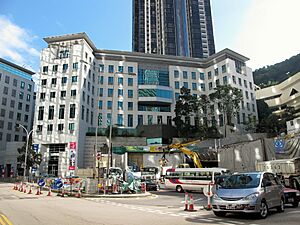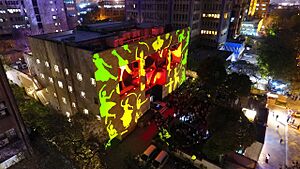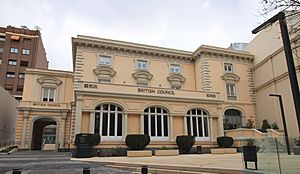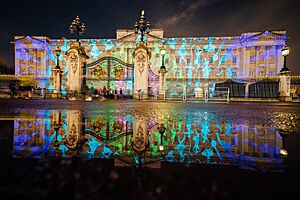British Council facts for kids
 |
|
| Founded | 1934 |
|---|---|
| Founder | British government |
| Type | Cultural institution |
| Headquarters | 1 Redman Place, Stratford, London E20 1JQ, England, United Kingdom |
|
Area served
|
Worldwide |
| Product | British cultural and language education |
|
Key people
|
Paul Thompson (Chair) Scott McDonald (Chief Executive) |
|
Revenue (2020–21)
|
£924,965,472 |
| Expenses (2020–21) | £1,015,114,434 |
| Website | www.britishcouncil.org |

The British Council is a British organisation specialising in international cultural and educational opportunities. It works in over 100 countries: promoting a wider knowledge of the United Kingdom and the English language (and the Welsh language in Argentina); encouraging cultural, scientific, technological and educational cooperation with the United Kingdom. The organisation has been called a soft power extension of UK foreign policy, as well as a tool for propaganda.
The British Council is governed by a Royal Charter. It is also a public corporation and an executive non-departmental public body (NDPB), sponsored by the Foreign, Commonwealth and Development Office. Its headquarters are in Stratford, London. Its chair is Paul Thompson and its chief executive is Scott McDonald.
Contents
History
- 1934: British Foreign Office officials created the "British Committee for Relations with Other Countries" to support English education abroad, promote British culture and fight the rise of fascism. The name quickly became the British Council for Relations with Other Countries.
- 1936: The organisation's name was officially shortened to the British Council.
- 1938: The British Council opened its first four offices in Bucharest (Romania), Cairo (Egypt), Lisbon (Portugal) and Warsaw (Poland). The offices in Portugal are currently the oldest in continuous operation in the world.
- 1940: King George VI granted the British Council a Royal Charter for promoting "a wider knowledge of [the United Kingdom] and the English language abroad and developing closer cultural relations between [the UK] and other countries".
- 1942: The British Council undertook a promotion of British culture overseas. The music section of the project was a recording of significant recent compositions by British composers: E.J. Moeran's Symphony in G minor was the first work to be recorded under this initiative, followed by recordings of Walton's Belshazzar's Feast, Bliss' Piano Concerto, Bax's Third Symphony, and Elgar's The Dream of Gerontius.
- 1944: In August, after the liberation of Paris, Austin Gill was sent by the British Council to reestablish the Paris office, which soon had tours by the Old Vic company, Julian Huxley and T. S. Eliot.
- 1946: The British Council collected handicraft products from crafts that were being practised in the British countryside for an "Exhibition of Rural Handicrafts from Great Britain" that travelled to Australia and New Zealand. The majority of the collection was sold to the Museum of English Rural Life in 1960 and 1961.
- 1948: The British Council sponsored a tour by the Old Vic Theatre Company to Australia and New Zealand. The cast was led by Laurence Olivier and Vivien Leigh, performing a repertoire of three plays: Richard III, The School for Scandal, and Skin of Our Teeth. In Australia, the company gave 179 performances and were seen by over 300,000 people. The tour made a profit of about £40,000.
- 1984: Kenneth Whitty, Deputy Director of the British Council in Athens, was murdered by militants from the Abu Nidal Organisation.
- 2007: The Russian Foreign Ministry ordered the British Council to close its offices outside Moscow. The Ministry alleged that it had violated Russian tax regulations, a move that British officials claimed was retaliation over the British expulsion of Russian diplomats allegedly involved with the poisoning of Alexander Litvinenko. This caused the British Council to cease carrying out all English-language examinations in Russia in January 2008. In early 2009, a Russian arbitration court ruled that the majority of the tax claims, valued at $6.6 million, were unjustified.
- 2011: On 19 August, a group of armed men attacked the British Council office in Kabul, the capital of Afghanistan, killing at least 12 people – none of them British – and temporarily took over the compound. All the attackers were killed in counter-attacks by forces guarding the compound. The British Council office was relocated to the British Embassy compound, as the British Council compound was destroyed.
- 2013: The British Council in Tripoli, Libya was targeted by a car bomb on the morning of 23 April. Diplomatic sources were reported as saying that "the bombers were foiled as they were preparing to park a rigged vehicle in front of the compound gate". The attempted attack was simultaneous with the attack on the French Embassy in Tripoli on the same day that injured two French security guards, one severely, and wounded several residents in neighbouring houses. A jihadist group calling itself the Mujahedeen Brigade was suspected, possibly linked to Al-Qaeda in the Islamic Maghreb.
Organisation
The British Council is a charity governed by Royal Charter. It is also a public corporation and an executive nondepartmental public body (NDPB), sponsored by the Foreign, Commonwealth and Development Office. Its headquarters are in Stratford, London. Its chair is Paul Thompson, and its CEO is Scott McDonald.
The British Council's total income in 2014–2015 was £973 million principally made up of £154.9 million grant-in-aid received from the Foreign, Commonwealth and Development Office; £637 million income from fees and teaching and examinations services; and £164 million from contracts.
The British Council works in more than 100 countries: promoting a wider knowledge of the UK and the English language; encouraging cultural, scientific, technological and educational understanding and cooperation; changing people's lives through access to UK education, skills, qualifications, culture and society; and attracting people who matter to the future of the UK and engaging them with the UK's culture, educational opportunities and its diverse, modern, open society.
In 2014–2015, the British Council spent: £489 million developing a wider knowledge of the English language; £238 million encouraging educational cooperation and promoting the advancement of education; £155 million building capacity for social change; £80 million encouraging cultural, scientific and technological cooperation; and £10 million on governance, tax and trading expenses.
Notable activities
English and examinations
The British Council offers face-to-face teaching in more than 80 teaching centres in more than 50 countries.
Three million candidates took UK examinations with the British Council in more than 850 towns and cities in 2014–2015.

The British Council jointly runs the global IELTS English-language standardised test with the University of Cambridge ESOL Examinations and IDP Education Australia. Over 2.5 million IELTS tests were delivered in 2014–2015.
Massive Open Online Course (MOOC)
In 2014, the British Council launched its first MOOC, Exploring English: Language and Culture, on the UK social learning platform FutureLearn. This was accessed by over 230,000 people.
English for peace
"Peacekeeping English" is a collaboration between the British Council, the Foreign, Commonwealth and Development Office and the Ministry of Defence to improve the English-language skills of military personnel through the Peacekeeping English Project (PEP). PEP is helping train approximately 50,000 military and police service personnel in 28 countries, amongst them Libya, Ethiopia and Georgia.
Mobility programmes
Education UK
In 2013, the British Council relaunched the global website Education UK for international students interested in UK education. The site receives 2.2 million visitors per year and includes a search tool for UK courses and scholarships, advice and articles about living and studying in the UK.
Erasmus+
From 2014 to 2020, the British Council and Ecorys UK jointly administered almost €1 billion of the €14.7 billion Erasmus+ programme offering education, training, youth and sports opportunity for young people in the UK. It was expected that nearly 250,000 people will have undertaken activities abroad with the programme.
Schools
Connecting Classrooms
Over 16,000 schools have taken part in an international school partnership or benefited from teacher training through the British Council Connecting Classrooms programmes.
Arts and culture
ACCELERATE
ACCELERATE was a leadership programme for Aboriginal and Torres Strait Islander people in the creative arts, run jointly by the British Council and the Australia Council in partnership with Australian state arts agencies, between 2009 and 2016. During that time, 35 people participated in the programme, with many alumni going on to excel in their fields.
UK-India Year of Culture
Her Majesty Queen Elizabeth II hosted the official launch of the UK-India Year of Culture on 27 February 2017 at Buckingham Palace, with Indian Finance Minister Arun Jaitley representing Prime Minister Narendra Modi. The British Council worked with the Palace and British-Indian start-up Studio Carrom to project a peacock, India's national bird, onto the facade of Buckingham Palace.
fiveFilms4freedom
In 2015, the British Council launched fiveFilms4freedom, a free, online, 10-day LGBT film festival with the British Film Institute, supported by the UN Free & Equal campaign. It was the first global online LGBT film festival. The festival runs a 24-hour campaign to ask people to watch a movie and show that love is a human right. In 2016, films were viewed by over 1.5m people in 179 countries.
Shakespeare Lives
In October 2015, the British Council announced a global programme with the BBC, British Film Institute, the National Theatre, the Royal Shakespeare Company, the Shakespeare 400 consortium, the Shakespeare Birthplace Trust and Shakespeare's Globe to celebrate Shakespeare's life and work on the 400th anniversary of this death.
Selector Radio
Selector Radio is a weekly two-hour radio show, produced by Folded Wing for the British Council. Originally launched in 2001, the show is now broadcast in more than 30 countries around the world, connecting a global audience to a wide range of music the United Kingdom has to offer, covering a variety of genres from grime, indie, soul, dance and more. The show features interviews, guest DJ mixes and exclusive live sessions from some of the UK's most exciting artists. It avoids many mainstream acts, in favour of emerging talent and underground styles. It has an estimated listenership of over four million people. The show is currently hosted in the UK by Sian Eleri since 2024 - previous hosts include Jamz Supernova, Goldierocks and Andrea Oliver – and many countries take the English language version of the show and create a new show from the tracks and features, translating the 'links' into the local language.
Cultural and educational exchange with North Korea
The British Council has been running a teacher training programme in North Korea since 2001. In July 2014 the British Council signed a Memorandum of Understanding with the Democratic People's Republic of Korea (DPRK) for cultural and educational exchange.
Other activities
Young Creative Entrepreneur Awards
The British Council's Young Creative Entrepreneurs Awards identify and support talented people from across the creative industries, such as the International Young Publisher of the Year, International Young Design Entrepreneur of the Year, International Young Music Entrepreneur of the Year and British Council West Africa Arts Programme ~ Creative Entrepreneurs 2018 awards.
Chairs
The Council has been chaired by:
- 1934–37 Lord Tyrrell
- 1937–41 Lord Lloyd
- 1941–45 Sir Malcolm Robertson
- 1946–55 Sir Ronald Adam
- 1955–59 Sir David Kelly
- 1959–67 Lord Bridges
- 1968–71 Lord Fulton
- 1971–72 Sir Leslie Rowan
- 1972–76 Lord Ballantrae
- 1977–84 Sir Charles Troughton
- 1985–92 Sir David Orr
- 1992–98 Sir Martin Jacomb
- 1998–2004 Baroness Kennedy of The Shaws
- 2004–09 Lord Kinnock
- 2010–16 Sir Vernon Ellis
- 2016–19 Christopher Rodrigues
- 2019–23 Stevie Spring
- 2024–present Paul Thompson
Trade unions
Some staff at the British Council are members of unions. UK staff are represented by the Public and Commercial Services Union. Some employees in Japan belong to the General Union.
Annex
Locations
The British Council is organised into seven regions.
Americas
The British Council has offices in:
 Argentina
Argentina Brazil
Brazil Canada
Canada Chile
Chile Colombia
Colombia Cuba
Cuba Jamaica
Jamaica Mexico
Mexico Peru
Peru Trinidad and Tobago
Trinidad and Tobago Uruguay
Uruguay United States
United States Venezuela
Venezuela
East Asia-Pacific
The British Council has offices in:
 Australia
Australia Brunei
Brunei Cambodia
Cambodia China
China Hong Kong
Hong Kong Indonesia
Indonesia Japan
Japan South Korea
South Korea Malaysia
Malaysia Myanmar
Myanmar New Zealand
New Zealand Philippines
Philippines Singapore
Singapore
Europe
The British Council has offices in:
 Albania
Albania Austria
Austria Belgium
Belgium Bosnia and Herzegovina
Bosnia and Herzegovina Bulgaria
Bulgaria Croatia
Croatia Cyprus
Cyprus Czech Republic
Czech Republic Estonia
Estonia France
France Germany
Germany Greece
Greece Hungary
Hungary Ireland
Ireland Italy
Italy Latvia
Latvia Lithuania
Lithuania Malta
Malta Montenegro
Montenegro Netherlands
Netherlands Macedonia
Macedonia Norway
Norway Poland
Poland Portugal
Portugal Romania
Romania Russia
Russia Serbia
Serbia Slovenia
Slovenia Slovakia
Slovakia Spain
Spain Switzerland
Switzerland Ukraine
Ukraine United Kingdom
United Kingdom
West Asia and North Africa
The British Council has offices in:
 Armenia
Armenia Azerbaijan
Azerbaijan Egypt
Egypt Algeria
Algeria Bahrain
Bahrain Georgia
Georgia Iraq
Iraq Jordan
Jordan Kuwait
Kuwait Lebanon
Lebanon Libya
Libya Kazakhstan
Kazakhstan Morocco
Morocco Oman
Oman Palestine
Palestine Qatar
Qatar Saudi Arabia
Saudi Arabia Syria
Syria Tunisia
Tunisia Turkey
Turkey United Arab Emirates
United Arab Emirates Uzbekistan
Uzbekistan Yemen
Yemen
South Asia
The British Council has offices in:
Sub-Saharan Africa
The British Council has offices in:
 Botswana
Botswana Cameroon
Cameroon Eritrea
Eritrea Ethiopia
Ethiopia Ghana
Ghana Kenya
Kenya Malawi
Malawi Mauritius
Mauritius Mozambique
Mozambique Namibia
Namibia Nigeria
Nigeria Senegal
Senegal Sierra Leone
Sierra Leone South Africa
South Africa South Sudan
South Sudan Sudan
Sudan Tanzania
Tanzania Zambia
Zambia Zimbabwe
Zimbabwe Rwanda
Rwanda Uganda
Uganda
See also
 In Spanish: British Council para niños
In Spanish: British Council para niños
- Eunic
- Teaching English as a Foreign Language (TEFL)
- Cultural diplomacy
- Public diplomacy




